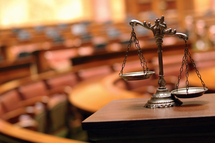
SAN ANTONIO - If you've ever been called for jury duty you know it involves a lot of questions posed by lawyers on both sides of a case. It's a face-to-face courtroom encounter that most dread.
With growing popularity of social media, the process has taken on a new dimension that you should consider the next time you update your status.
When the lawyers begin working to fill these seats at the outset of a trial there is a common objective.
"What both sides can really hope for is that they have a just jury," said Defense Attorney Robert Featherston.
Featherston is among the growing list of lawyers who use social media to help accomplish that objective.
The Bexar County District Attorney's Office also turns to technology in the process.
"We would be remiss if we didn't use all of the tools that are available to us," said Cliff Herberg, first assistant DA.
Judges are also logging on.
"As judges we will ask, 'Do you have a Facebook page?' We are interested to see what kind of things they are posting," said Judge Laura Salinas, with the 166th District Court.
All inquiries made by judges and attorneys using social networks are subject to American Bar Association guidelines published recently. The primary concern is that there is no contact with potential jurors.
But many prospective jurors are wary of that searching.
"I don't agree with them looking into my personal Facebook for whatever reason," said David Pena, a prospective juror.
However, if you leave it out there for everybody to see, that's what you've done, it's not an intrusion.
Social media appears to be in the court to stay; whether it is good or bad, both the state and the defense agree on one thing -- the jury is still out.
So for those summoned to jury duty, don't be surprised to get a question you may not anticipate.
(SOURCE)
With growing popularity of social media, the process has taken on a new dimension that you should consider the next time you update your status.
When the lawyers begin working to fill these seats at the outset of a trial there is a common objective.
"What both sides can really hope for is that they have a just jury," said Defense Attorney Robert Featherston.
Featherston is among the growing list of lawyers who use social media to help accomplish that objective.
The Bexar County District Attorney's Office also turns to technology in the process.
"We would be remiss if we didn't use all of the tools that are available to us," said Cliff Herberg, first assistant DA.
Judges are also logging on.
"As judges we will ask, 'Do you have a Facebook page?' We are interested to see what kind of things they are posting," said Judge Laura Salinas, with the 166th District Court.
All inquiries made by judges and attorneys using social networks are subject to American Bar Association guidelines published recently. The primary concern is that there is no contact with potential jurors.
But many prospective jurors are wary of that searching.
"I don't agree with them looking into my personal Facebook for whatever reason," said David Pena, a prospective juror.
However, if you leave it out there for everybody to see, that's what you've done, it's not an intrusion.
Social media appears to be in the court to stay; whether it is good or bad, both the state and the defense agree on one thing -- the jury is still out.
So for those summoned to jury duty, don't be surprised to get a question you may not anticipate.
(SOURCE)
 RSS Feed
RSS Feed